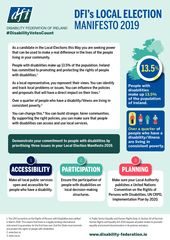DFI’s Local Election Manifesto 2019
Issued on March 13 2019
As a candidate in the Local Elections this May you are seeking power that can be used to make a real difference in the lives of the people living in your community.
People with disabilities make up 13.5% of the population. Ireland has committed to promoting and protecting the rights of people with disabilities.[1]
As a local representative, you represent their views. You can identify and track local problems or issues. You can influence the policies and proposals that will have a direct impact on their lives.[2]
Over a quarter of people who have a disability/illness are living in consistent poverty.[3]
You can change this.[4] You can build stronger, fairer communities. By supporting the right policies, you can make sure that people with disabilities can access and use local services.
Demonstrate your commitment to people with disabilities by prioritising three areas in your Local Election Manifesto 2019.
These are:
- Accessibility - Make all local public services are open and accessible for people who have a disability.
- Participation - Ensure the participation of people with disabilities on local decision-making structures.
- Planning – Make sure your Local Authority publishes a United Nations Convention on the Rights of Persons with Disabilities, UN CRPD, Implementation Plan by 2020.
Accessibility - Make all local public services accessible for people with disabilities.
People with disabilities have a right to access local public services on an equal basis to others. However, across communities they continue to experience barriers to accessing important services such as:
- Housing,
- Physical environment,
- Local education, training, and employment,
- Transport, and
- Health services.
What needs to happen to tackle the exclusion of people with disabilities’?
Local authorities have been given greater responsibility for economic, social and community development and so their role as coordinators of local services is increasing.[5] Local representatives can support integrated working across the community and voluntary sector, the Health Service Executive, HSE, and other statuary bodies at local level. Key developments include:
Local Authorities and Housing:
- Commit to a minimum of 7% of all social housing stock in 2019 to appropriate housing for people with disabilities.[6] That would be both new build and acquisition.
- Work with Approved Housing Bodies, AHBs, to ensure the provision of appropriate housing for people with disabilities.
Physical Environment:
Support the development of:
- Accessible playgrounds, beaches, etc.
- Accessible roads, footpaths, etc.
- Access to sports and cultural facilities.
Health:
- Ensure that local authority works collaboratively with the HSE to make sure that strategies and plans align and complement each other.
Education, Training and Employment:
- Local authorities can work with other bodies, e.g. the Education and Training Boards, ETBs, and SOLAS to support the participation of people who have a disability in local training, education and activation programmes.
- Appoint Disability Experts at Education and Training Boards ETBs, as the local support person for students with disabilities.
Participation - Ensure the participation of people with disabilities on local decision-making structures.
People with disabilities need to be actively involved decision-making structures that are affecting the local community.
The key aims here are to:
- Support the participation and representation of people with disabilities across decision-making fora at the local level, e.g. Public Participation Networks, PPNs, and Linkage Groups.
- Ensure that people with disabilities who are not involved in local organisations or Public Participation Networks have a means to make their voices heard.
- Support voluntary disability organisations to enhance the capacity of people with disabilities to participate in local structures.
Planning - Each Local Authority should publish a UN CRPD Implementation Plan by 2020.
Local authorities lead on economic, social and community developments. Also, in the planning and management of local programmes.
Local authorities need to embed disability commitments into local strategies and plans, such as the Local Economic and Community Plan, LECP.
To do this most effectively requires:
- Your Local Authority drafts its own Implementation Plan for the UN Convention on the Rights of Persons with Disabilities.
[1] The UN Convention on the Rights of Persons with Disabilities was ratified in March 2018. This means that there is a legally binding international instrument to guarantee, for the first time ever, that the State must promote and protect the rights of people with disabilities.
[2] www.tasc.ie
[4] Public Sector Equality and Human Rights Duty, in Section 42 of the Irish Human Rights and Equality Act 2014 requires all public bodies to promote equality and prevent discrimination in its policies and plans.
[5] Shannon, L. (2018) Local Government as Local Service Coordinator. https://bit.ly/2NxAmB4.
[6] In 2017 approximately 7% of all households that qualified for social housing, qualified on the basis of disability or medical or compassionate grounds. Summary of Social Housing Assessments 2017, p. 21 https://bit.ly/2MsEO2l.

